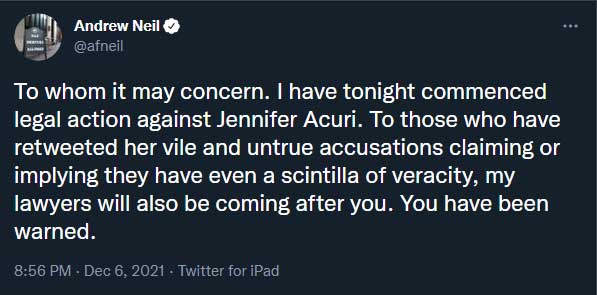It is a truth, universally acknowledged that social media can be a colosseum for both the greatest and the worst that mankind can present. For some it is a great opportunity to interact, learn and share news with those of similar, or differing beliefs; from whether Brexit was a good idea, to which football player was to blame for their team's latest defeat. For others, it is a lawless wasteland where people can (and do) pour extreme views and language, hiding behind the veil of anonymity. "It's only the internet, it isn't serious" or "It's only banter" used as a throwaway excuses to justify the bile that rages from their fingertips.
But what if you were legally responsible for what you posted? Well, you are. You just probably don't realise it.
I was idly scrolling through Twitter recently when it was brought to my attention about Andrew Neil, the Scottish journalist and broadcaster beginning legal proceedings against Jennifer Arcuri over a (since deleted) tweet that implied his connection to the ongoing scandal about Jeffrey Epstein, an accusation he strenuously denies. Not only that, but he would also take similar action against "those who have retweeted her vile and untrue accusations".
Many responded by questioning how they could be implicated by simply retweeting the offending post, claiming the move did not equate to endorsement. Some queried whether it would be possible for someone to try to sue everyone that retweeted a libellous social post.

It's happened before though, and there's nothing to suggest it can't happen again. You won't go to prison (defamation is a Civil offence, not a Criminal one) but you may well have to pay damages.
In 2013, Lord McAlpine, a Conservative peer alleged that he was defamed by comments suggesting that he was a paedophile published by Sally Bercow, the wife of the (at the time) Speaker of the House of Commons. McAlpine brought an action not only against Bercow, but to anyone that 'retweeted' the initial claim. The court found the allegation to be without merit; McAlpine had won.
If an offending user had less than 500 followers, they were required to settle out of court by donating £25 to the charity Children In Need. Approximately 20 'high profile accounts' (read: those with more than 500 followers) were pursued separately, among those being Bercow herself and other well-known public figures of TV and the literary world.
This case has set a precedent; that people can, and will be held accountable for their words on social media platforms. There are many questions that people still ask: "what if the offending post is deleted?" "What if my retweet wasn't meant to show I agree with it?"
Well, tough.
It's important to understand the mechanics of how Twitter works: a user can share (in this case, 'retweet') a post from another account - effectively sharing it onto their own account and for all their followers to see. It is not attributed to them, they are just amplifying the tweet to a new audience. That there is where the offence occurs. You may not have made the initial allegation, but you are publishing it further. You are, in the eyes of the law, seen to be 'endorsing' it - even if you make it abundantly clear that 'Retweets do not mean endorsements' as some put in their profiles, in some vague effort to distance themselves from what they have engaged with.
When people, or businesses post material online, they act as publishers and their publications are subject to the same laws and "are as legally responsible as those of professional publishers, such as newspapers or broadcasters.".
This is not just limited to Twitter - this also extends to other social platforms. In 2015, the parent of a former pupil at St. John’s Preparatory School in North London was ordered to pay significant damages after posting an online petition in which they made a series of untrue allegations. In 2019, The former leader of the DUP Party, Arlene Foster successfully claimed £125,000 in damages after the TV presenter Dr Christian Jessen tweeted an unfounded claim of Foster taking part in an extra-marital affair.
Well, the simple and obvious answer is: don't make statements that you cannot back up with information - even retweeting/sharing it can leave you open to potential action.
Many claim that because they are hiding behind an anonymous name, or using various methods to disguise their online visibility whether using VPNs or anonymous browsing methods such as the Tor network. How well these methods are actually set up and utilised will depend on how 'anonymous' one actually is.
The real issue is simple and one that I think everyone has the ability to adhere to. It is summed up by the actor Wil Wheaton, in what is more commonly known as Wheaton's Law.
Even when you think it doesn't count because it is online, it doesn't make you immune from the law. If you stop and think before hitting that 'retweet' or 'share' button, it might stop you from perpetuating misinformation.
So for your own sake, think before you post.